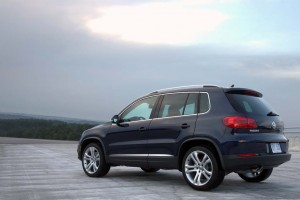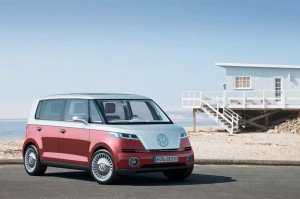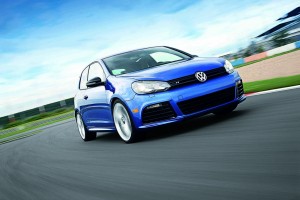With a goal of more than doubling sales – to 800,000 a year – by 2018, Volkswagen officials are rapidly ramping up the maker’s U.S. line-up and expect to have several new offerings roll into dealer showrooms over the next few years, including a 7-passenger SUV and possibly a production version of the popular Bulli microvan concept.
But the maker’s secret weapon may be its increasing reliance on diesel powertrains, which are gaining converts at a rapid rate. Facing the prospect of tough new fuel economy regulations, Volkswagen is betting on the latest generation of oil-burners — though it will also be rolling out an array of electrified offerings, including hybrids, plug-ins and pure battery-electric vehicles, the maker’s top U.S. executive told TheDetroitBureau.com.
“Our challenge is to dig deeper” and come up with new products “appropriate for the U.S. market,” explained Jonathan Browning, the British automotive veteran who signed on as CEO of the Volkswagen Group of America last year.
The good news, he suggested, is that there is a deep well of product available within the global VW portfolio. Even better, the long-ignored U.S. subsidiary is now high on the radar screen in Wolfsburg, which sees a strong presence in the States as essential to Volkswagen’s global ambitions. By 2018 the maker intends to be selling 10 million vehicles annually worldwide, a target that could position it as a serious challenger to both Toyota – the global leader for the last several years – and General Motors, which is expected to regain the sales crown this year.

Expect to see a third VW SUV model, priced between the Tiguan (shown here) and the flagship Touareg - but offering 7 seats.
Underscoring VW’s commitment is a $4 billion investment in new product – and the new assembly plant in Chattanooga, Tennesse that recently began producing a version of the midsize Passat specifically designed for American buyers.
But Browning acknowledged that there are some notable gaps in the maker’s line-up and said he is trying to prioritize which to fill. Don’t expect to see a pickup truck, but one of the next new models will likely be a 7-passenger sport-utility vehicle.
“From a pricing standpoint,” he explained, it will slip in-between the current Tiguan and Touareg models. But it will be larger than the Touareg, the maker’s U.S. flagship. The market for 7-seaters continues to grow – even as more makers enter that segment, Infiniti formally unveiling its own JX model last week.

Browning hopes to get a U.S. version of the Bulli concept, which would be a modern revival of the legendary Microbus.
There’s another “people-mover” catching Browning’s eye. He’s trying to work up a business case, he confides, for the Bulli, the well-received concept that was unveiled at the Geneva Motor Show last winter. The prototype borrowed the German nickname of the long-popular microvan that, in Microbus trim, was as much an icon in the U.S. as the Beetle during the ‘60s and ‘70s.
The possibility of bringing over the Bulli raises the question of what will happen to the maker’s current minivan, the Routan, the product of a joint venture with Chrysler.
“We’re committed to the current lifecycle” of that van, said Browning, adding that, “We haven’t gotten to the point that we have to make a decision about its successor.” He wouldn’t discuss the timeframe for making that go/no-go decision.
Yet another product Browning would like to be selling in the States is the sporty Scirocco. “If I could, I wave a magic wand and get it into the market….but that’s not going to happen this (product) cycle.”
While sheet metal is typically what draws buyers into the showroom, VW is gaining traction with its push for diesel power. So far this year, sales of oil-burner-powered models have risen 40%, diesels accounting for 22% of the VW brand’s U.S. sales during the first seven months of 2011. That compares to 18.3% during the same period in 2010.
Browning said he is hoping to see the Obama Administration show more interest in diesel technology as part of its new Corporate Average Fuel Economy standards, which will bump mileage to an average 54.5 mpg by 2025. Ironically, the executive noted, diesels are already outselling all hybrids, plug-ins and other electric vehicles by more than two-to-one in the U.S. market, despite their limited availability.
“To me, diesel is the unexploited opportunity,” said the British-born executive. But VW isn’t putting all its eggs in the proverbial single basket.
The maker has already introduced its first U.S. hybrid-electric vehicle, and more will follow, though Browning believes the technology is really “transitional.” He’s more upbeat about plug-in technology, which is also under development at VW, as well as pure battery-electric power. The maker’s first BEV will be a version of its global best-seller, the Golf.
A battery version of the pint-sized Up, a microcar debuting in Europe late this year, is also under development, though Browning said that, at this point, he doesn’t see much potential for the little 3-door, whether battery-powered or using a conventional internal combustion engine. (For more on the VW Up, Click Here.)
The push for new product and powertrains marks a distinct shift in direction for Volkswagen, which was once the market’s most successful automotive importer. But after the initial Beetle model went away and its successor, the Rabbit, lost momentum, Germany seemed to lose interest, shifting attention to alternative markets, especially the so-called BRIC nations, acknowledged Browning, referring to Brazil, Russia, India and China – it is in a dead heat with GM for dominance in the latter country, today the largest motor vehicle market in the world.
But it has become clear that without rebuilding demand in the States it will be difficult to impossible to meet that 10 million annual sales goal. A key part of the turnaround process “requires a manufacturing base in North America,” said Browning, pointing to the new Tennessee plant. Significantly, that facility has plenty of room for future expansion.
There has been some speculation that this additional space could be used to set up a second plant for the sibling Audi brand – though a senior VW Group source said it would be more likely the luxury brand would go elsewhere if it decided to come to the U.S.
Audi chief Rupert Stadler has said he will make that decision by 2015, but Browning hinted, “I believe he’d like to make that decision as soon as possible.”

